University Healthcare Ethics: Healing and Autonomy Case Study Analysis
VerifiedAdded on 2022/10/18
|6
|1269
|43
Case Study
AI Summary
This case study analyzes the ethical complexities surrounding a child's kidney failure and his parents' reliance on spiritual intervention, clashing with medical recommendations. The assignment addresses three key questions: First, it explores whether a physician should respect a patient's autonomy even when decisions seem harmful. Second, it examines how Christians should view sickness, health, and medical intervention, and what actions a Christian parent should take in balancing faith and medical care, considering beneficence and non-maleficence. Finally, it discusses how a spiritual needs assessment can guide the physician in supporting the family and determining appropriate interventions. The analysis incorporates Christian perspectives and ethical principles to provide a comprehensive understanding of the case.
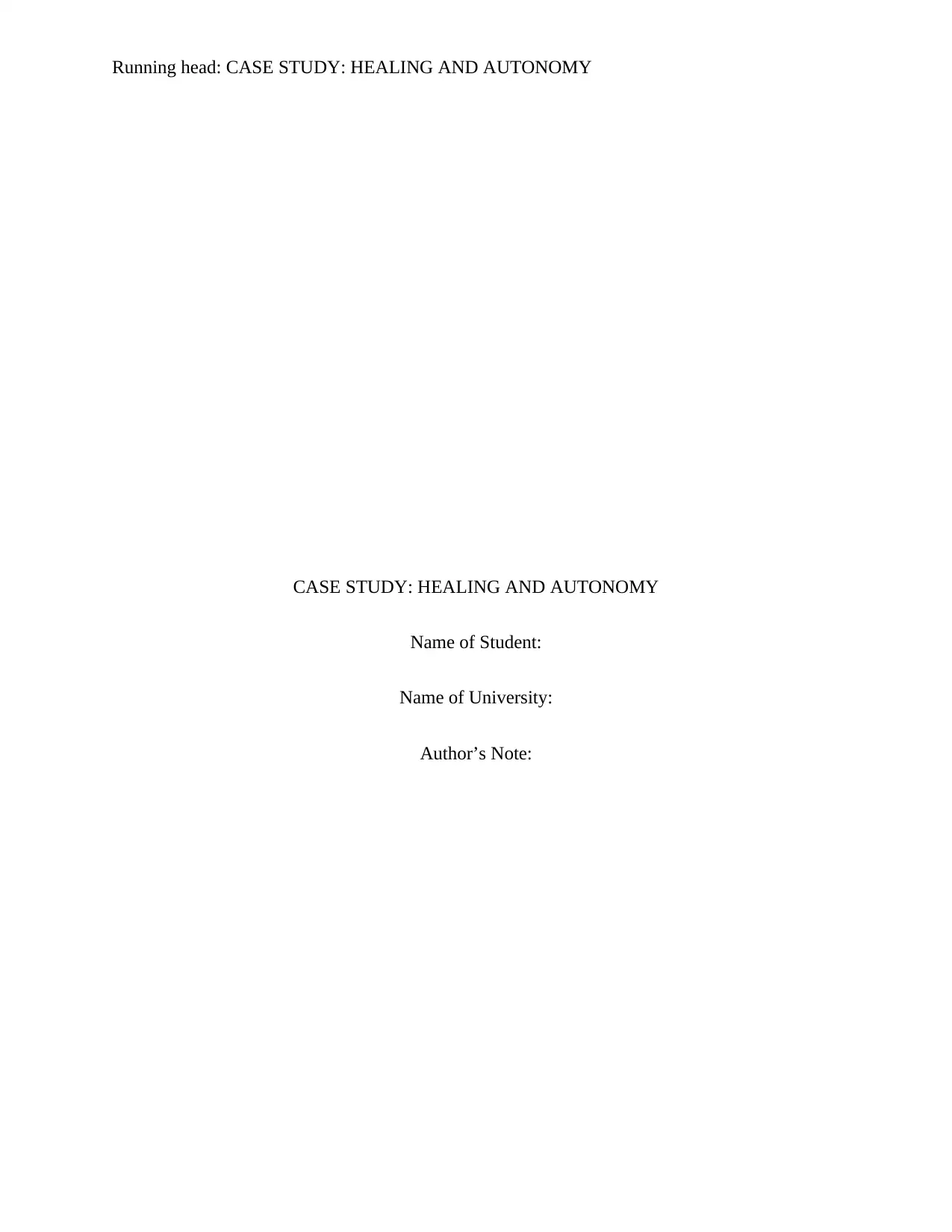
Running head: CASE STUDY: HEALING AND AUTONOMY
CASE STUDY: HEALING AND AUTONOMY
Name of Student:
Name of University:
Author’s Note:
CASE STUDY: HEALING AND AUTONOMY
Name of Student:
Name of University:
Author’s Note:
Paraphrase This Document
Need a fresh take? Get an instant paraphrase of this document with our AI Paraphraser
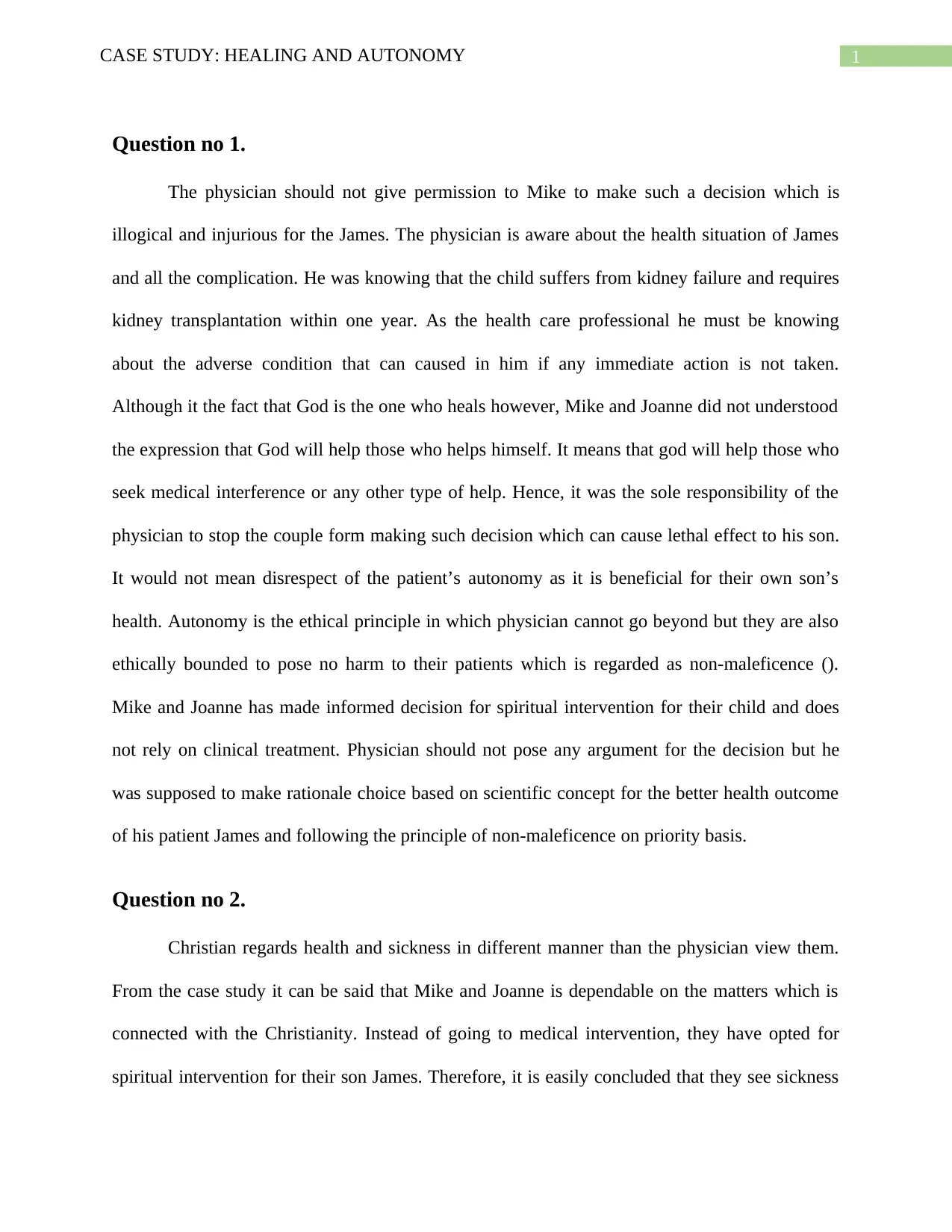
1CASE STUDY: HEALING AND AUTONOMY
Question no 1.
The physician should not give permission to Mike to make such a decision which is
illogical and injurious for the James. The physician is aware about the health situation of James
and all the complication. He was knowing that the child suffers from kidney failure and requires
kidney transplantation within one year. As the health care professional he must be knowing
about the adverse condition that can caused in him if any immediate action is not taken.
Although it the fact that God is the one who heals however, Mike and Joanne did not understood
the expression that God will help those who helps himself. It means that god will help those who
seek medical interference or any other type of help. Hence, it was the sole responsibility of the
physician to stop the couple form making such decision which can cause lethal effect to his son.
It would not mean disrespect of the patient’s autonomy as it is beneficial for their own son’s
health. Autonomy is the ethical principle in which physician cannot go beyond but they are also
ethically bounded to pose no harm to their patients which is regarded as non-maleficence ().
Mike and Joanne has made informed decision for spiritual intervention for their child and does
not rely on clinical treatment. Physician should not pose any argument for the decision but he
was supposed to make rationale choice based on scientific concept for the better health outcome
of his patient James and following the principle of non-maleficence on priority basis.
Question no 2.
Christian regards health and sickness in different manner than the physician view them.
From the case study it can be said that Mike and Joanne is dependable on the matters which is
connected with the Christianity. Instead of going to medical intervention, they have opted for
spiritual intervention for their son James. Therefore, it is easily concluded that they see sickness
Question no 1.
The physician should not give permission to Mike to make such a decision which is
illogical and injurious for the James. The physician is aware about the health situation of James
and all the complication. He was knowing that the child suffers from kidney failure and requires
kidney transplantation within one year. As the health care professional he must be knowing
about the adverse condition that can caused in him if any immediate action is not taken.
Although it the fact that God is the one who heals however, Mike and Joanne did not understood
the expression that God will help those who helps himself. It means that god will help those who
seek medical interference or any other type of help. Hence, it was the sole responsibility of the
physician to stop the couple form making such decision which can cause lethal effect to his son.
It would not mean disrespect of the patient’s autonomy as it is beneficial for their own son’s
health. Autonomy is the ethical principle in which physician cannot go beyond but they are also
ethically bounded to pose no harm to their patients which is regarded as non-maleficence ().
Mike and Joanne has made informed decision for spiritual intervention for their child and does
not rely on clinical treatment. Physician should not pose any argument for the decision but he
was supposed to make rationale choice based on scientific concept for the better health outcome
of his patient James and following the principle of non-maleficence on priority basis.
Question no 2.
Christian regards health and sickness in different manner than the physician view them.
From the case study it can be said that Mike and Joanne is dependable on the matters which is
connected with the Christianity. Instead of going to medical intervention, they have opted for
spiritual intervention for their son James. Therefore, it is easily concluded that they see sickness
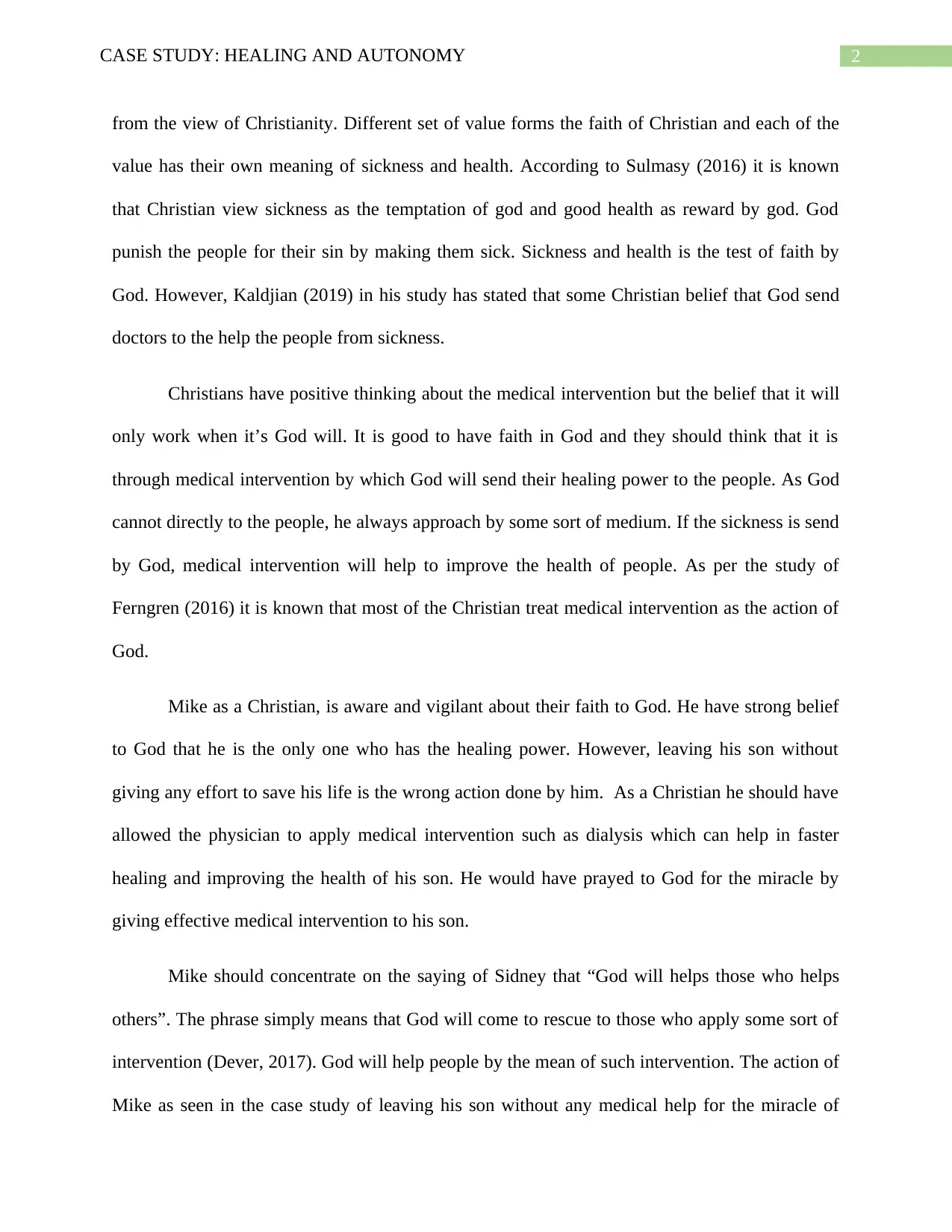
2CASE STUDY: HEALING AND AUTONOMY
from the view of Christianity. Different set of value forms the faith of Christian and each of the
value has their own meaning of sickness and health. According to Sulmasy (2016) it is known
that Christian view sickness as the temptation of god and good health as reward by god. God
punish the people for their sin by making them sick. Sickness and health is the test of faith by
God. However, Kaldjian (2019) in his study has stated that some Christian belief that God send
doctors to the help the people from sickness.
Christians have positive thinking about the medical intervention but the belief that it will
only work when it’s God will. It is good to have faith in God and they should think that it is
through medical intervention by which God will send their healing power to the people. As God
cannot directly to the people, he always approach by some sort of medium. If the sickness is send
by God, medical intervention will help to improve the health of people. As per the study of
Ferngren (2016) it is known that most of the Christian treat medical intervention as the action of
God.
Mike as a Christian, is aware and vigilant about their faith to God. He have strong belief
to God that he is the only one who has the healing power. However, leaving his son without
giving any effort to save his life is the wrong action done by him. As a Christian he should have
allowed the physician to apply medical intervention such as dialysis which can help in faster
healing and improving the health of his son. He would have prayed to God for the miracle by
giving effective medical intervention to his son.
Mike should concentrate on the saying of Sidney that “God will helps those who helps
others”. The phrase simply means that God will come to rescue to those who apply some sort of
intervention (Dever, 2017). God will help people by the mean of such intervention. The action of
Mike as seen in the case study of leaving his son without any medical help for the miracle of
from the view of Christianity. Different set of value forms the faith of Christian and each of the
value has their own meaning of sickness and health. According to Sulmasy (2016) it is known
that Christian view sickness as the temptation of god and good health as reward by god. God
punish the people for their sin by making them sick. Sickness and health is the test of faith by
God. However, Kaldjian (2019) in his study has stated that some Christian belief that God send
doctors to the help the people from sickness.
Christians have positive thinking about the medical intervention but the belief that it will
only work when it’s God will. It is good to have faith in God and they should think that it is
through medical intervention by which God will send their healing power to the people. As God
cannot directly to the people, he always approach by some sort of medium. If the sickness is send
by God, medical intervention will help to improve the health of people. As per the study of
Ferngren (2016) it is known that most of the Christian treat medical intervention as the action of
God.
Mike as a Christian, is aware and vigilant about their faith to God. He have strong belief
to God that he is the only one who has the healing power. However, leaving his son without
giving any effort to save his life is the wrong action done by him. As a Christian he should have
allowed the physician to apply medical intervention such as dialysis which can help in faster
healing and improving the health of his son. He would have prayed to God for the miracle by
giving effective medical intervention to his son.
Mike should concentrate on the saying of Sidney that “God will helps those who helps
others”. The phrase simply means that God will come to rescue to those who apply some sort of
intervention (Dever, 2017). God will help people by the mean of such intervention. The action of
Mike as seen in the case study of leaving his son without any medical help for the miracle of
⊘ This is a preview!⊘
Do you want full access?
Subscribe today to unlock all pages.

Trusted by 1+ million students worldwide
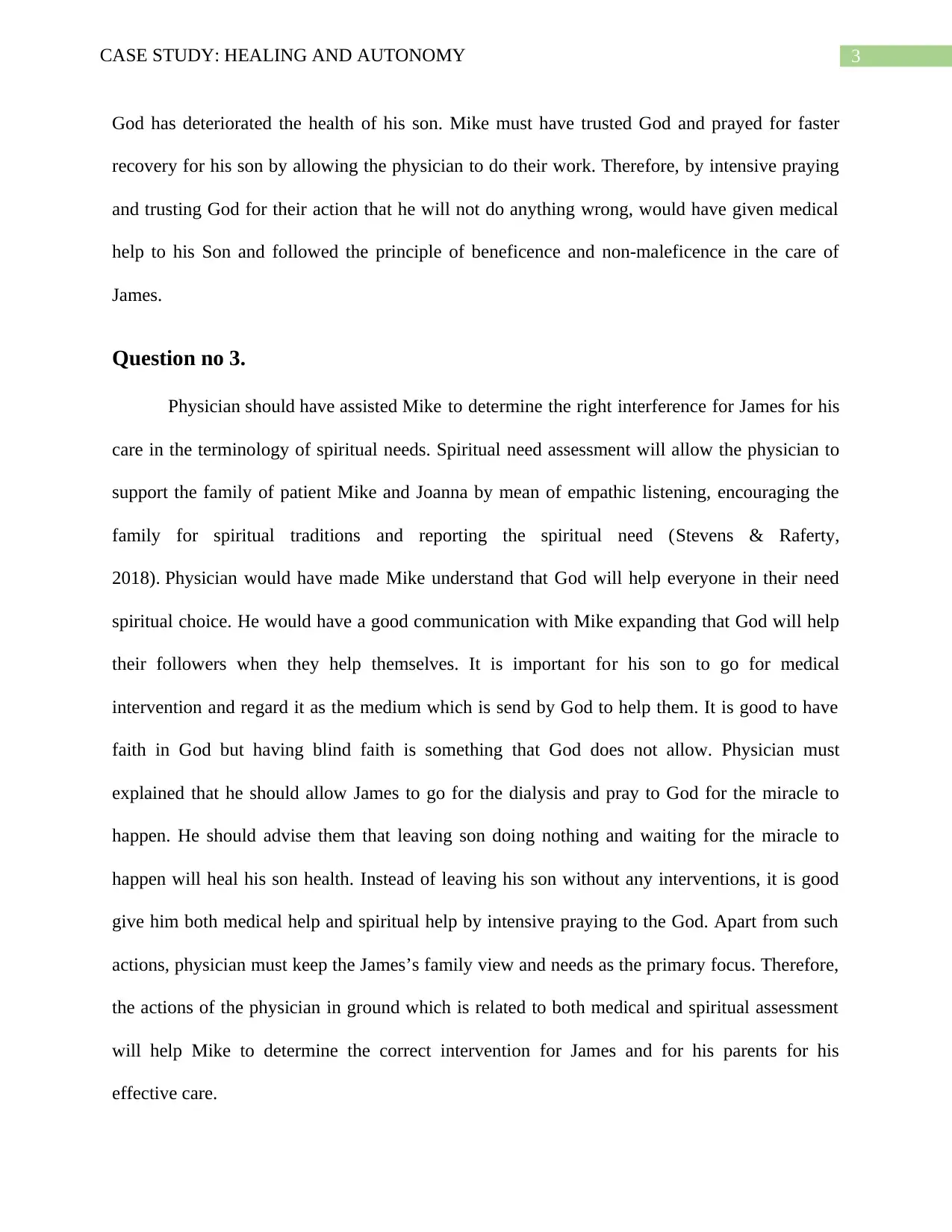
3CASE STUDY: HEALING AND AUTONOMY
God has deteriorated the health of his son. Mike must have trusted God and prayed for faster
recovery for his son by allowing the physician to do their work. Therefore, by intensive praying
and trusting God for their action that he will not do anything wrong, would have given medical
help to his Son and followed the principle of beneficence and non-maleficence in the care of
James.
Question no 3.
Physician should have assisted Mike to determine the right interference for James for his
care in the terminology of spiritual needs. Spiritual need assessment will allow the physician to
support the family of patient Mike and Joanna by mean of empathic listening, encouraging the
family for spiritual traditions and reporting the spiritual need (Stevens & Raferty,
2018). Physician would have made Mike understand that God will help everyone in their need
spiritual choice. He would have a good communication with Mike expanding that God will help
their followers when they help themselves. It is important for his son to go for medical
intervention and regard it as the medium which is send by God to help them. It is good to have
faith in God but having blind faith is something that God does not allow. Physician must
explained that he should allow James to go for the dialysis and pray to God for the miracle to
happen. He should advise them that leaving son doing nothing and waiting for the miracle to
happen will heal his son health. Instead of leaving his son without any interventions, it is good
give him both medical help and spiritual help by intensive praying to the God. Apart from such
actions, physician must keep the James’s family view and needs as the primary focus. Therefore,
the actions of the physician in ground which is related to both medical and spiritual assessment
will help Mike to determine the correct intervention for James and for his parents for his
effective care.
God has deteriorated the health of his son. Mike must have trusted God and prayed for faster
recovery for his son by allowing the physician to do their work. Therefore, by intensive praying
and trusting God for their action that he will not do anything wrong, would have given medical
help to his Son and followed the principle of beneficence and non-maleficence in the care of
James.
Question no 3.
Physician should have assisted Mike to determine the right interference for James for his
care in the terminology of spiritual needs. Spiritual need assessment will allow the physician to
support the family of patient Mike and Joanna by mean of empathic listening, encouraging the
family for spiritual traditions and reporting the spiritual need (Stevens & Raferty,
2018). Physician would have made Mike understand that God will help everyone in their need
spiritual choice. He would have a good communication with Mike expanding that God will help
their followers when they help themselves. It is important for his son to go for medical
intervention and regard it as the medium which is send by God to help them. It is good to have
faith in God but having blind faith is something that God does not allow. Physician must
explained that he should allow James to go for the dialysis and pray to God for the miracle to
happen. He should advise them that leaving son doing nothing and waiting for the miracle to
happen will heal his son health. Instead of leaving his son without any interventions, it is good
give him both medical help and spiritual help by intensive praying to the God. Apart from such
actions, physician must keep the James’s family view and needs as the primary focus. Therefore,
the actions of the physician in ground which is related to both medical and spiritual assessment
will help Mike to determine the correct intervention for James and for his parents for his
effective care.
Paraphrase This Document
Need a fresh take? Get an instant paraphrase of this document with our AI Paraphraser
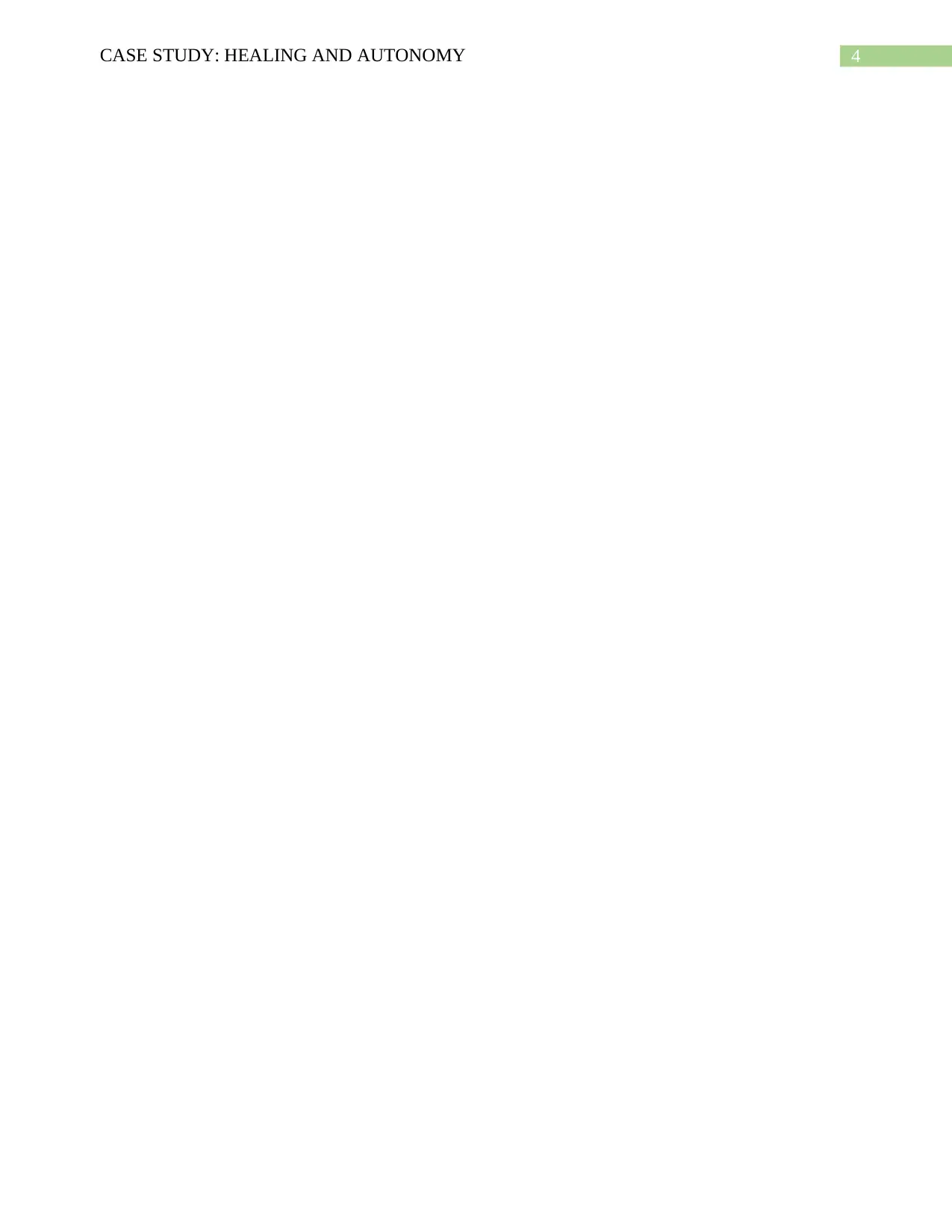
4CASE STUDY: HEALING AND AUTONOMY
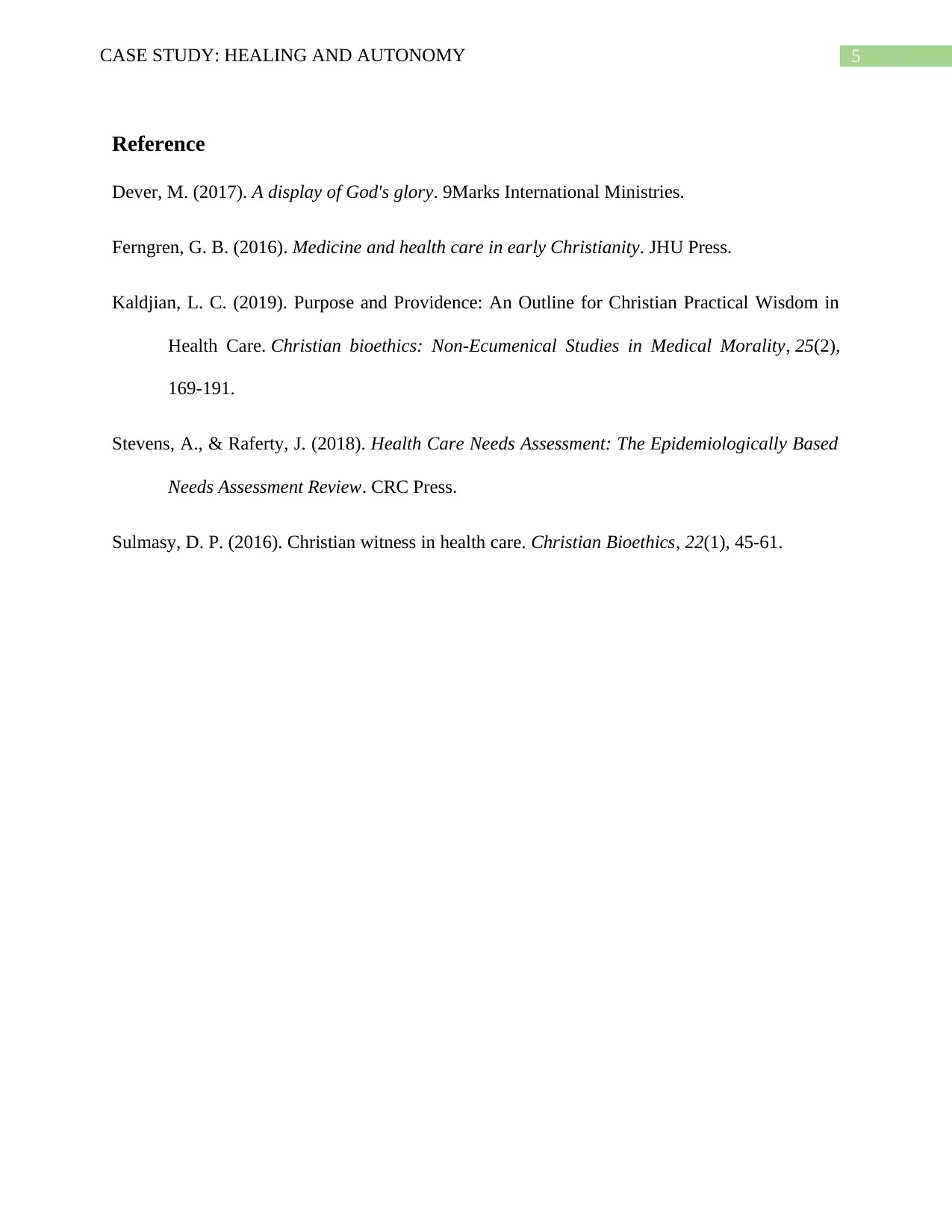
5CASE STUDY: HEALING AND AUTONOMY
Reference
Dever, M. (2017). A display of God's glory. 9Marks International Ministries.
Ferngren, G. B. (2016). Medicine and health care in early Christianity. JHU Press.
Kaldjian, L. C. (2019). Purpose and Providence: An Outline for Christian Practical Wisdom in
Health Care. Christian bioethics: Non-Ecumenical Studies in Medical Morality, 25(2),
169-191.
Stevens, A., & Raferty, J. (2018). Health Care Needs Assessment: The Epidemiologically Based
Needs Assessment Review. CRC Press.
Sulmasy, D. P. (2016). Christian witness in health care. Christian Bioethics, 22(1), 45-61.
Reference
Dever, M. (2017). A display of God's glory. 9Marks International Ministries.
Ferngren, G. B. (2016). Medicine and health care in early Christianity. JHU Press.
Kaldjian, L. C. (2019). Purpose and Providence: An Outline for Christian Practical Wisdom in
Health Care. Christian bioethics: Non-Ecumenical Studies in Medical Morality, 25(2),
169-191.
Stevens, A., & Raferty, J. (2018). Health Care Needs Assessment: The Epidemiologically Based
Needs Assessment Review. CRC Press.
Sulmasy, D. P. (2016). Christian witness in health care. Christian Bioethics, 22(1), 45-61.
⊘ This is a preview!⊘
Do you want full access?
Subscribe today to unlock all pages.

Trusted by 1+ million students worldwide
1 out of 6
Related Documents
Your All-in-One AI-Powered Toolkit for Academic Success.
+13062052269
info@desklib.com
Available 24*7 on WhatsApp / Email
![[object Object]](/_next/static/media/star-bottom.7253800d.svg)
Unlock your academic potential
Copyright © 2020–2026 A2Z Services. All Rights Reserved. Developed and managed by ZUCOL.




